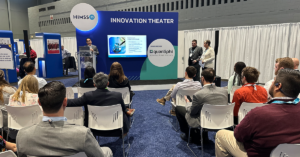Since 1994, America has observed National Nurses Week annually from May 6-12. This year more than ever before, it’s critical that healthcare organizations go beyond recognition and start taking action to more effectively support and serve nurses. One important step in the journey to effect meaningful change is using data to inform decision-making at all levels. While there is no simple cure-all to burnout and turnover, this post will explore three key ways that harnessing the power of analytics can help transform nurse wellbeing and satisfaction.
1. Support post-pandemic healing
Working as a nurse is rarely easy, but working as a nurse during a global pandemic took the challenges and traumas to a new, nearly unfathomable level. The pandemic painfully demonstrated how truly demanding and difficult the profession is. To promote healing — mentally and physically — examine your organization’s COVID-19 patient volumes, comorbidities and mortality over the past 14+ months. These data points and trends can help you identify which service lines, shifts and specific nurses carried the heaviest burden throughout the pandemic – and therefore who may require the most support and focus in recovering.
2. Inform your staffing strategy
Determining the true acuity of patients is essential to making smart, sustainable and safe nurse staffing decisions. Data analytics can be used to analyze and draw insights from clinical codes and charts to ensure that nurse to patient ratios make sense and assignments are being managed appropriately. Ultimately, an effective staffing strategy supports nurse health and longevity, while also allowing them to provide patients with the best care and attention.
3. Encourage growth
When interpreted and applied correctly, data can be incredibly empowering. When shared without context or direction, however, data can be remarkably depressing and feel almost disciplinary. If you simply show nurses a massive dashboard of their patients’ outcomes and situations, they’ll often walk away internalizing guilt and feeling heightened burnout. Conversely, if you can do the leg work of drawing out meaningful insights from the data and facilitating related education and open discussions, nurses are more likely to feel supported and motivated. In turn, patients will have better experiences, marked by data-driven clinical decisions and actions.
At first glance, focusing on data analytics may feel like a departure from the heart of healthcare (patient care). Upon further examination, however, it’s clear that effectively collecting and analyzing data may actually be the key to keeping that heart running smoothly for years to come. Data is not just numbers; it tells stories, teaches lessons and inspires change. As George Santayana so wisely stated, “Those who cannot remember the past are condemned to repeat it.”
This Nurses Week, consider how your organization can deploy analytics solutions that strengthen and equip nurses to heal and support patients.
Get our take on industry trends
Best practice tools to build an integrated approach to multimorbidity
The traditional model of treating single diseases no longer works. Data collected from 2016 to 2019 indicated that 32.9% of…
Read on...Will adopting a risk-based approach with augmented analytics support care gap closure?
A common challenge for healthcare systems is how to properly segment its patient populations based on risk profiles and co-morbidities. Doing this well ensures a high quality of care delivery and superior patient outcomes.
Read on...4 questions healthcare executives are asking about augmented analytics
At our annual Impact Summit, I had the privilege to talk about augmented analytics and address questions from healthcare executives—many…
Read on...



